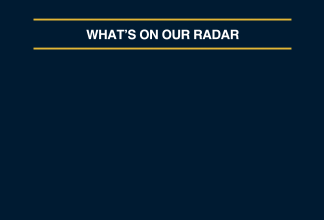5 Investing Lessons to Take into 2024
Written by The Inspired Investor team
Published on January 8, 2024
minute read
Share:
If only a year went by where there were no economic concerns or market ups and downs, and every investing move you made resulted in a big payoff. Unfortunately, the past year was as unpredictable as ever, with elevated inflation, rising rates and stock markets outperforming expectations despite persistent fears of an economic downturn.
While no one can know exactly how 2024 will unfold, there are a few investing lessons we can take into the new year to help us at least feel more prepared for what may come.
Lesson #1: Forecasting is imprecise
Heading into a new year is a natural time to start making predictions for what's to come, but even economists know that can be tricky. “There are no crystal balls, so don't invest with a presumption that you have all the answers," says Eric Lascelles, Chief Economist for RBC Global Asset Management.
For instance, while many market watchers did expect interest rates to rise in 2022, almost none – not even the Bank of Canada itself – expected the overnight rate to reach 5 per cent this year.
As for 2024, many economists think rates could decline, which may buoy the equity markets, but when and by how much is anyone's guess. And there's no guarantee rates will fall at all. The main lesson for those investing for the long term, says Lascelles, is to stay invested. “Markets are humbling each and every year," he notes. “So be in there and take your punches. It works out over an extended period of time."
Lesson #2: Don't forget about fixed income
To help spur the economy after the Great Recession in 2008, central banks dropped their overnight rates to record-low levels and didn't increase them in any meaningful way until May 2022. As a result, bond yields plummeted, falling so low that many questioned whether fixed income still had a place in a portfolio. Few would question the value of fixed income today, which has delivered strong returns over the past two years. “Looking straight at yields, bonds are much more attractive today," says Lascelles.
Bonds are also worth considering because they tend to move higher when stocks go lower and vice versa. While that didn't happen in 2022 and parts of 2023 when both bond and stock prices fell, Lascelles is confident the two asset classes will return to their traditional behaviour of moving in opposite directions. “The risk premium between stocks and bonds has vanished, which is another way of saying you should be more comfortable holding more bonds," he explains. “I will still defend the balanced 60 per cent stocks and 40 per cent bonds portfolio."
Lesson #3: Diversification vs concentration
Everyone would love to find a hot stock that they can make big money off, but the chances of that happening are generally slim. Heading into 2023, many investors thought that the remarkable streak of outperformance by the so-called Magnificent Seven (Alphabet, Apple, Amazon, Meta, Microsoft, NVIDIA and Tesla) had fizzled out. It turns out these stocks drove many of the market gains over the past year.
If you held a concentrated portfolio that didn't own one of these companies, you would have missed out on some significant returns, says Lascelles. Since it's impossible to know which stocks will do well in any given year, maintaining a diversified portfolio, with holdings across sectors, geographies and asset classes, gives you the best chance of coming out ahead. “It's easy to miss out on gains with an overly concentrated portfolio," he notes. “In a world where it's hard to pick the winner right, choosing a small number of stocks means you can miss out on the big winners."
Lesson #4: Be mindful of debt
Many investors say they prefer owning companies that don't have much debt, but that was less of an issue in a low-rate environment when businesses could easily pay off their loans. As rates have climbed, though, debt has once again become a hot topic. According to Fitch Ratings, corporate default rates are expected to rise in 2024 from 2023 levels. RBC Wealth Management, in its Global Insight 2024 Outlook for Canada, says “we continue to expect some level of corporate pain" because “companies are being forced to pay up to issue new debt and refinance old debt, in many cases at costs that are three times higher than 2020 levels."
In other words, Lascelles says that investors will need to make sure that any businesses they're considering buying can manage through a higher-rate environment. “There is still a very real risk premium put on the borrowing costs of (certain) types of entities," he explains. “The higher-rate story benefits some and punishes others, and so it has been an important consideration for investors."
Lesson #5: Business cycles can last a long time
Between the many market ups and downs – especially in Canadian equities, which bounced around like a see-saw – investors had to have a lot of resolve to stay invested. At the same time, given the improving economic data, people may now be getting too excited about 2024. “Here we are almost two years into rate hiking and we haven't seen a recession," notes Lascelles. “People are now ceasing to fret about it, but we're still somewhat concerned."
People need to remember that business cycles can take months, if not years, to play out. While we're now in a late-stage cycle, it took more than a decade to get to this point and it could still take time before we move into the next phase. The lesson here? “Don't try and zip in and out of markets with great precision," says Lascelles. “It takes time."
We'll soon see what's in store as 2024 begins to play out, but the overall takeaway is that the world is unpredictable. Remembering why you're investing in the first place and knowing how long your investing road is ahead can help you weather market ups and downs.
RBC Direct Investing Inc. and Royal Bank of Canada are separate corporate entities which are affiliated. RBC Direct Investing Inc. is a wholly owned subsidiary of Royal Bank of Canada and is a Member of the Investment Industry Regulatory Organization of Canada and the Canadian Investor Protection Fund. Royal Bank of Canada and certain of its issuers are related to RBC Direct Investing Inc. RBC Direct Investing Inc. does not provide investment advice or recommendations regarding the purchase or sale of any securities. Investors are responsible for their own investment decisions. RBC Direct Investing is a business name used by RBC Direct Investing Inc. ® / ™ Trademark(s) of Royal Bank of Canada. RBC and Royal Bank are registered trademarks of Royal Bank of Canada. Used under licence. © Royal Bank of Canada 2024.
Any information, opinions or views provided in this document, including hyperlinks to the RBC Direct Investing Inc. website or the websites of its affiliates or third parties, are for your general information only, and are not intended to provide legal, investment, financial, accounting, tax or other professional advice. While information presented is believed to be factual and current, its accuracy is not guaranteed and it should not be regarded as a complete analysis of the subjects discussed. All expressions of opinion reflect the judgment of the author(s) as of the date of publication and are subject to change. No endorsement of any third parties or their advice, opinions, information, products or services is expressly given or implied by RBC Direct Investing Inc. or its affiliates. You should consult with your advisor before taking any action based upon the information contained in this document.
Furthermore, the products, services and securities referred to in this publication are only available in Canada and other jurisdictions where they may be legally offered for sale. If you are not currently a resident of Canada, you should not access the information available on the RBC Direct Investing Inc. website.
Explore More

Here’s What Every Canadian Should Know About Estate Planning
Insights from Leanne Kaufman to help you feel more confident as you plan
minute read

3 Things We're Watching This Week
What the Inspired Investor team is watching
minute read

What’s Driving the Recent Surge in Gold Prices
Here are some things to watch with the gold market
minute read
Inspired Investor brings you personal stories, timely information and expert insights to empower your investment decisions. Visit About Us to find out more.







